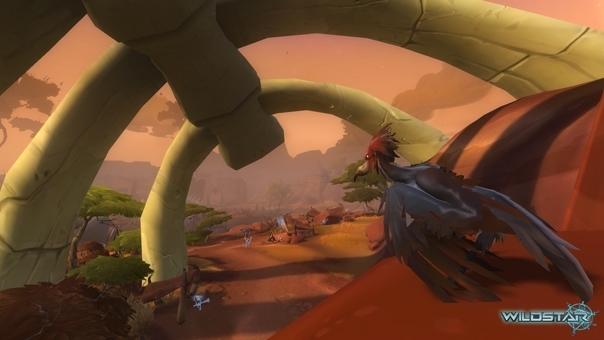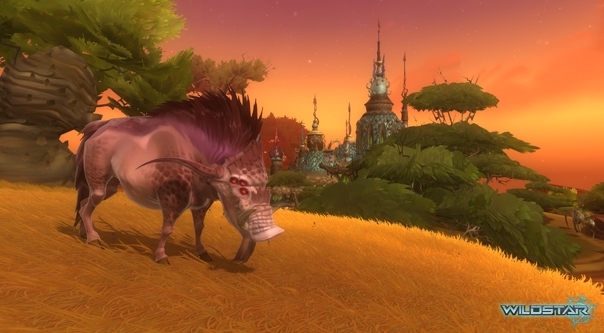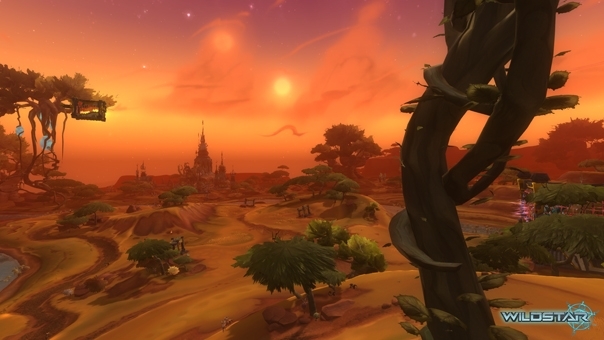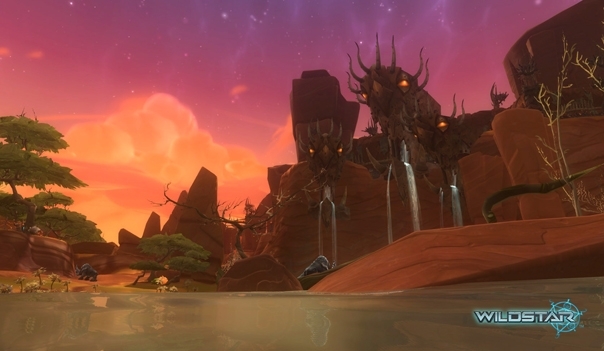WildStar: Architecting the Community
Troy Hewitt, Loic Claveau and David Bass from the WildStar Community Team share their thoughts on growing the community, ArkShip, beta and beyond.

That fan feedback doesn’t just disappear into a vortex either, with Hewitt explaining how they read individual comments before choosing how to react. “If, for instance, we get a whole group of people that have a certain concern or have a certain assumption that is incorrect, rather than going somewhere on a forum and replying to each one of those people, what we’ll do is we’ll craft an article that addresses that publicly.” He added that the team isn’t afraid to go to where the conversation is, on fan forums, IRC or Twitter.
According to Bass, the weekly updates are also about helping the fans earn recognition from contributing to the community. “I don’t care who knows my name, I want to see that people start recognizing someone who always contributes on Twitter every week in the conversation. I want people to know who that guy is and it was like “oh yeah, I agreed with him on that thing that week”, and if we can keep doing that with players through launch and beyond it would be amazing.” As the community evolves, Hewitt also added that he’s looking to feature more creations from the fans. “We also want to see what the community brings to the table, and start taking some of their ideas, and incorporating them into our schedule.”
When I asked Hewitt if he had any unfulfilled wishes on his list, he mentioned one that he was hoping to get fulfilled – a way of turning community generated content upside down. He said that he would love to build a website in a similar style to Reddit, that “blended the art of reputation as currency” in rewarding community members for good quality submissions. He’s also eager to change the front page from content they produce internally to “the best our community has put together.” He also thinks that social networks have a vital role to play, saying that “social media can really serve as a connective tissue of a community.” As it’s not something they can buy off-the-shelf; it’s something that the team is working out the scale and scope of.
Bass argued that his wish list is constantly evolving, adding that size of the community helps to keep things nimble. “One of my favorite things about coming to work here is that we have the freedom to experiment, and our fans are very flexible with that too. Being able to try a bunch of things that we always thought would be really cool, and seeing if they work or if they don’t, and adjusting from there, is really great, especially at this stage where we don’t have to worry about four million people watching us. We have a nice community that will actually keep an eye on what we’re doing and give us feedback, and we can change and adjust on the fly. It’s awesome for solidifying that wishlist and figuring out what to knock off of it and what to put on it.”

Captain of the Arkship
Carbine also recently announced a series of events grandly named ‘Arkship 2013’, where selected fans will be invited to spend time with developers and provide feedback on the game. The first of these is happening later this month in the US, while another is planned for Europe in April. For Hewitt, it’s something that’s been a long time in the making. “I wanted to do fan events since probably about two years ago, when we talked about what marketing would look like, how community fits into that picture and the kind of resources that we would need. We had to delay some of that as we built our team and continued to work on WildStar, but because of our relationship with those people and because it’s an authentic ‘I know your name’ relationship, I can call you up or send you an email and say ‘Hey, why don’t you come and hang out with us at ArkShip 2013, and let’s have you sit down with a designer, developer or programmer, and talk about game development’.”
It’s an initiative that has plenty of people excited, and Hewitt’s not surprised at the response. “I think it’s every gamer’s dream to get an opportunity to sit down with the people that are making the world they want to live in. The Arkship concept, for me, is one of those things that I’ve taken with me from place to place to place, and having a more intimate gathering where you sit down with people who have a real passion for what you’re doing, even if they disagree.”
“I love the people that love us, I love that, they’re great. And the positive support that we get is fantastic. But we also want people that are a little dubious about the statements that we’re making. I want to be able to know that we can bring someone in who’s critical of what we’re doing, and if they have valid concerns we can address them, or they play and go ‘oh, I get it, I like it’ - that’s a validation that’s to me truly important. Turning that person from a naysayer to an evangelist, that’s no small feat but it’s an important one. I guess the short answer is I wasn’t surprised that people were excited, I only feel bad that we can’t invite three hundred people.”
It’s also possible that the Arkship might grow into something bigger, as Hewitt explained. “A part of my vision is, whether we work with other studios like our friends over at ArenaNet, but that we move toward doing these conventions where people can get together and have this dialogue, so we start small and then we’ll grow it.” That said, the team is eager to keep smaller events where appropriate, with Bass giving his reasons why. “I’ve done these sorts of events at other companies, and they’re a lot of fun, but once you get past a certain size, you lose that intimacy of being able to speak one-on-one with a developer, or being able to sit in a small room and give your feedback.”
Bass added “One of the core things we’re doing for Arkship is a lot of the event is going to be under NDA. It’s not an event to be like how awesome we are, it’s an event where we genuinely want people to come in, see some stuff we haven’t shown before and get their feedback. If this system sucks, great, this is how we’re going to find out about it. I would be so excited if we could do giant events, but we definitely want to keep these small ones too.”

Anticipating Beta
Beyond the Arkship events, closed beta lurks on the horizon. I asked the team what it will be like moving from the Friends & Family ‘Core Tester’ program to beta and beyond, with Hewitt sharing his opinions on transitioning beta communities. “Friends and Family to Closed Beta is an easier transition. Closed beta to open beta, it’s like clash of the titans. It’s this community that is so invested and so into it, it has become a part of their daily lifestyle, and then you get a bunch of people who aren’t quite as smitten with the game, and they come in and take a big dump on the forums, and are rude to the testers.”
“That is when I think it becomes the most crucial aspect of being a community manager, because you’ve got to help this influx of new people understand the social norms that you’ve established because some of them could have tested for two years or longer, depending on who they are. I think one of the larger challenges that a community manager has is managing those transitions and making sure that you are building bridges between those groups, because you don’t want to exclude the older folk, but they need to evolve to understand this is an MMO. It’s a massively multiplayer online game, and the multiplayer part’s pretty important for us because while we like our game, and we like to make games, we also like to get paid.”
Claveau added that the move to beta is also the perfect time to spot the people that stand out in a community. “You also identify leaders, the people that are influential, the people that are committed to the point where they take things upon themselves, and they say ‘I’m going to organise the debate’ for example. You know these old people, I sometimes call them Class Leaders - they love that class, and then they play that class and become an expert, to the point where even the devs are not as good. Some will keep that for themselves, but you’ve got the others who are going to start to organize things, who are going to try and make other people understand. I think it’s very important to try and identify these people and maybe to even push them to take more, and empowering them in a sense, because they’re going to be helpful for your community.”

Ready for Launch?
With the launch window pencilled in as late 2013, I asked if Hewitt, Bass and Claveau were excited to see the culmination of years of work being opened up to fans. Hewitt responded eagerly “I chose to work at Carbine because I believed in the game. I love the art style. I worked with a lot of really great teams in the industry, and Carbine’s no different, but my love for the game is more real than any other project I’ve worked on. I really feel like we’ve got something here. We’ve got an art style where I want to go to there. I want to play there. It rekindled that feeling I had when I was playing Ultima Online, The promise of this world, I couldn’t be more excited,”
Claveau agreed. “When I saw the game the first time I was like ‘Wow, this is unexpected, and I really dig the style.’ And also it’s the team, especially as I came from the publisher, and then I came into the studio, and I see this bunch of people, crazy people, very creative people, and so I want to be part of it, and I really love it. With this team of community people, it’s not just a bunch of jaded people who say ‘we’re just going to do community management through forums and that’s it’, so it’s all about finding the feature. We have way more involvement in the entire studio beyond community management.”
Bass concurred. “I needed something fresh, I needed something that doesn’t take itself too seriously. Obviously we take our job seriously, but that doesn’t mean that the game has to be serious, that doesn’t mean that the community has to be serious. I just like logging in and wandering around, there’s so much to see and do. And it makes me so excited that we can finally talk about it more.”
If there’s one thing that the team hope WildStar leaves us with, it’s memories of our time in the world. For Claveau, that stems from wanting to turn MMO players from being just one of many heroes, to being unique within the world.
“There’s one thing I’ve always pursued; it’s how to try and have the players, or at least most of them, have their fifteen minutes of fame. And it’s a constant struggle to find ideas and to find concepts that would make that possible, maybe for in game events, maybe chronicles, maybe through content that you write on the website and stuff like that. And so we have a few ideas that we explore right now, but that is my thing. Immersion makes sure that people, when they play our MMO, when they decide to leave one day, then they leave with memories.”
“It’s what I want people to keep, because when I played Meridian 59, when I played Ultima Online, I can’t really remember the game now, but all I remember is the moments that left a memory. I remember a castle attack, I remember losing my key and having my house completely robbed, and I remember doing the same. EverQuest was the same, I remember some of the encounters with the huge dragon, and the raid that lasted seven hours with a hundred people. And these are memories.”
“And that’s what I think is really important because somewhere you carry the game with you. Not only that, but you talk with passion, where you talk about the dream as if you were reliving them, and so people get intrigued an get ‘hmm, maybe I want to try that as well.’”
I’d like to thank the WildStar Community Team for giving up their valuable time. And although Beta may be a few months away yet, I’m anticipating the memories yet to come.
Gareth “Gazimoff” Harmer, Senior Contributing Editor




